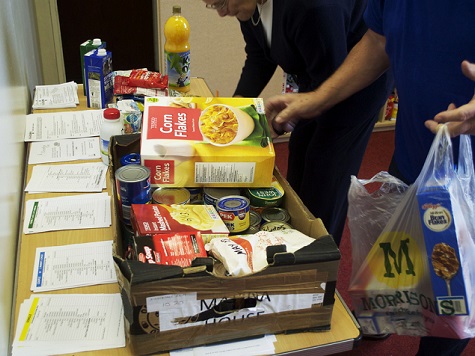The Archbishop of Canterbury has backed a report calling on the government to spend at least £150 million on food banks. Writing in the Mail on Sunday he has said that “hunger stalks large parts of our country.” However, a number of Conservative Lords and Members of Parliament disagree, turning the issue into yet another skirmish during a long term feud between the Conservative Party and the Church of England.
The Archbishop Justin Welby is due to appear in the Palace of Westminster tomorrow in order to launch a report by the All-Party Parliamentary Inquiry into Hunger in Britain. The report has been led by Labour MP Frank Field and the Bishop of Truro, the Right Reverend Tim Thornton, known to be a passionate supporter of food banks. Also present on the panel were Two Tory MPs, a Conservative peer and a Labour MP, according to the Mail.
It was funded by the Archbishop of Canterbury’s Charitable Trust, and Welby himself is understood to have played a supporting role in its creation – the report’s authors pay tribute to “the support he has given throughout our inquiry.”
The report spells out a number of un-costed recommendations including calls for a new organisation called ‘Feeding Britain’, which would work towards a “hunger free Britain”. Eight cabinet members would sit on its board. It also calls for bigger food banks under the banner of “Food Banks Plus”, which would distribute more food and assist with advice.
Other recommendations include raising the minimum wage; providing free school meals during the holidays (one of the few costed recommendations, estimated at £130 million a year for Primary School children alone); action to make supermarkets give away more food to the needy; and changes to the benefits regime which would make it harder to strip people of benefits, instead issuing them with a yellow card for first offences.
Remarkably, the report makes these recommendations despite acknowledging that churches and charities have already stepped in to help those facing hunger and poverty, on a scale described as “equivalent to a social Dunkirk.” It goes on to note that “this extraordinary achievement has been done without the assistance of central government. If the Prime Minister wants to meet his Big Society it is here.”
In his article, Archbishop Welby writes “The report makes practical recommendations that should be seized upon by politicians and charities alike. It seeks to bring people together from churches, food banks, the food industry and government to make a real difference.”
The Rt Rev Thornton says in the report: “It is time to review the fundamental values that led to the creation of our welfare state. The rise in food banks indicates a deeper problem in our society; the “glue” that used to be there is no longer there in many instances.”
However, some Conservatives have questioned the true need for food banks in modern Britain. The Welsh Tory MP Guto Bebb said: “There are some who appear to use food banks while being able to smoke and pay for a Sky TV package,” while his colleague Paul Maynard said: “We can’t make food banks part of the welfare state … it can become a habit.”
Chief Whip Michael Gove has suggested that families turning to food banks to make ends meet need more help in learning how to manage their finances, rather than ongoing food hand-outs. And Lord Freud suggested that more people use food banks because more food banks exist. “It is difficult to know which came first – supply or demand,” he said.
His comments were predictably panned by the left, but the increasing use of food banks has in part lain in the willingness of the coalition government to promote them. The previous Labour government had put in place a ban on Job Centre staff handing out vouchers for food banks; a ban which was overturned by Iain Duncan Smith when he took the reins as welfare secretary.
Conservative commentator Harry Phibbs called on Labour’s former welfare secretary to issue an apology over the ban, writing “I visited the food bank in my borough recently.
“I discussed ensuring the council issued vouchers for those who needed them – for example those waiting for a benefits payment to come through. I suppose if my efforts are effective then more people will use the Hammersmiith and Fulham Food Bank and the Labour Party will say this is evidence of increased poverty due to the uncaring Tories.”
The row marks another battle between the Conservative party and the Church of England that dates back to Thatcher’s reign. In 1985 then Archbishop Robert Runcie commissioned a 400 page report, titled Faith In The City which made a number of recommendations, heavily drawing on leftist ideology. A Tory minister of the time dismissed it as “pure Marxist theology”.
More recently, 43 bishops, supported by the Archbishops of Westminster and York, attacked Cameron’s government over welfare reform, with Justin Welby saying that a “civilised society” had a duty towards the poor and vulnerable.

COMMENTS
Please let us know if you're having issues with commenting.